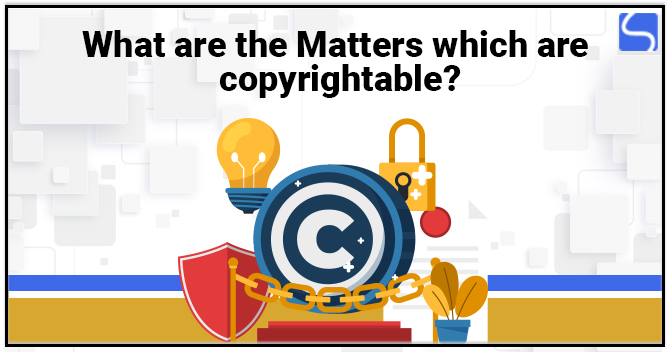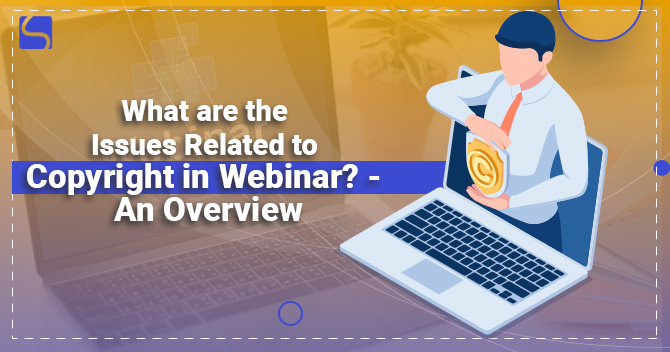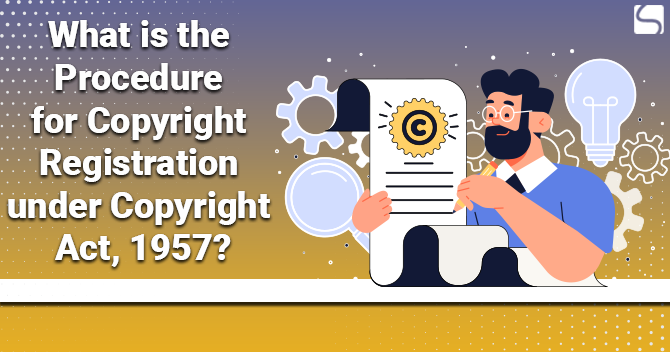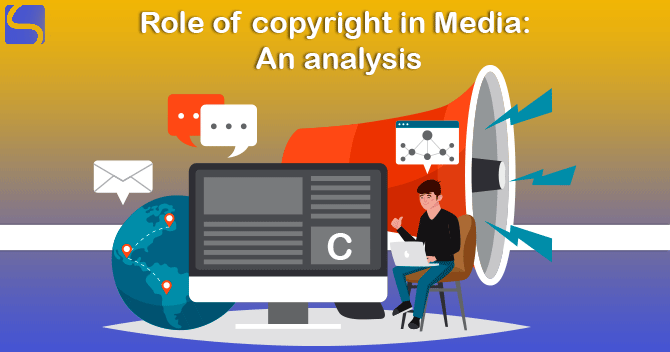What are the Matters which are Copyrightable?

Japsanjam Kaur Wadhera | Updated: Mar 10, 2021 | Category: Copyright
Copyright is an exclusive right that is provided to the creator or author of the original work for a fixed number of years. The copyright law is governed by the India Copyright Act, 1957 and provides protection of literary, artistic, dramatic, sound recording etc., work. Even though it is not mandatory to register for copyright of work however, it is advisable that one must register the copyrighted work so as the copyright registration would provide as a proof of ownership in the court of law. This article will provide you with the information regarding what are the matters which are copyrightable under the Copyright Act.
Table of Contents
Understanding Copyright
Copyright is basically an exclusive right that protects the expression of idea of the creator, author and artist which is related to the mass communication. The copyright law protects only form of expression of idea and not the idea as such. The growth and development of the society or the country is based upon the creativity and skills or its people. There such activities are encourages under the copyright law. The purpose of copyright is to reward and secure the general benefits that is, the labor of the authors on the work produced by them. It encourages the creators, artists or authors to produce with more work on regular basis.
it shall be noted that a copyright remains valid for a period of 60 years in India for the dramatic, literary, artistic and musical works after the death of the author or creator. And in the case of the sound recording and cinematograph films the term is 60 years, starting from the commencement of the calendar year next following year in which it is released or published. Besides this, the authors are also given the statutory, economic and moral rights under the copyright law once the copyright registration is done.
Why is there a need for protect under copyright law?
- The copyright protection creates an atmosphere conducive to the creativity.
- It encourages and induces to create more and motivates the other people to create since it recognizes the work.
- Work that is created by a particular person cannot be claimed for ownership by someone else over many years.
- It provides many legal rights and benefits to the creator or author of the original work once the copyright is registered under the copyright act.
- It provides recognition of the original work of the author or creator.
Also, Read: What are the Legal Actions Taken Against Copyright Infringement?
Prerequisites to get protection under the copyright law
In order to get the protection under the copyright law, it is necessary that the work should possess the following:
- It must be an original work- the original work means that such work is created from the inspiration and is not copied from any other already existing work. It is important that the work is created for the first time.
- The work must be fixed in tangible form- the work must be presented or expressed in a physical form and it should be capable of being recognized in a fixed form that is in its existence or tangible form such as on documents, paper, recording on optical media, paintings, web servers and etc.
- The work must be a first publication- the work that is original must not be published before.
Work in which copyright subsists/ matters which are copyrightable Section 13
Following are the matters which are copyrightable: –
- According to the section 13 of the Copyright Act, the copyright shall subsist in the following classes of work throughout India, such as:
- original Dramatic, Artistic, Literary, musical works
- Sound recording
- Cinematograph films
Examples:
- Literary works includes poems, novels, film scripts, scientific articles.
- Artistic work included cartoons, maps, paintings, drawing sculpture, design, photographs
- Choreographic works such as dance or ballet
- Musical work such as musical pieces with or without words.
- Cinematograph work such as films, video games, television shows
The word original is not clearly defined under the copyright act but it is largely understood as work that “owes its origin to the author”. It is necessary that the work must originate from the labour and skills of the author and must not be copied from any other work. Also the word “original” is prefixed to the literary, musical, dramatic and artistic works and not to the sound recordings and cinematograph films as the latter are the works that are made by using the former categories of works.
For example: Cinematograph film is made by using a script which a form of a literary work. Even though there is no expression stipulated regarding the “originality” concerning the sound recordings, and cinematograph films, copyright does not subsist in a cinematograph film if the substantial part of that film is an infringement of copyright in any other work.
Copyright does not exist in a sound recording made in respect of dramatic, musical, literary work, if in sound recording the copyright of such work is infringed.
According to Article 9(2) of the TRIPS and Article 2 of WCT, 1996 is that copyright does not subsist in ideas and it only protects original expression of the ideas. That is, the copyright protection is available for works which are in tangible form.
- The copyright shall not in in of the work stated in sub- section (1) other than the work to which the provisions of section 40 or 41 shall apply, unless:
- In case of published work, where it is first published in India, or where it is first published outside India, the author is at the date of such publication or in case of the death of the author at that date, was a citizen of India.
- In case of unpublished work, other than architectural work, the author at the time or date of the making of the work a citizen of India or domiciled in India.
- In case of architectural work, such work is located in India
Explanation: In case of joint authorship work, the conditions conferring copyright stated in this sub- section shall be satisfied by all authors of the work.
- Copyright shall not subsist in:
- Any cinematograph film if the substantial part of the film is a copyright infringement in other work.
- Any sound recording made in regard to the dramatic, literary or musical work if when making the sound recording the copyright work is infringed.
- The copyright in sound recording or in cinematograph film shall not affect the separate copyright in work in respect of which or the substantial part of which the film or in any other case the sound recording is made.
- In the case of architectural work, the copyright shall subsist only in the design and artistic work and will not extend to method or processes of construction.
Defining Copyright- Section 14
Under the Copyright Act, 1957 copyright means the exclusive right subjected to the provisions of the act, to do or authorize to do any of the below mentioned acts in respect of a work or any substantial part thereof, such as: –
In case of dramatic, literary or musical work not being a computer programme
- To reproduce work in any material form which also includes storing it in any manner, be it any medium by electronic means;
- Issuing copies of work to the public but not being the copies that are already in circulation;
- To perform or communicate the work in public;
- To make any work which is a cinematograph film or a sound recording;
- Making any translation of the work;
- Making any adaptation of the work;
- To do any act specified or stated in relation to the work in sub- clause (i) to (vi) which is related to the translation or adaptation of work.
In case of computer programme
- To do any of the acts which are stated in clause (a)
- To give or sell on commercial rental or offer for sale any copy of the computer programme
Provides that such commercial rental does not apply in computer programme where the programme is not an essential object of rental.
In case of an artistic work
- To reproduce such work in any material form that includes:
- To store it in any form or medium by electronic or other means.
- Depicting in three- or two- dimensional work.
- Depicting in two- or – three- dimensional work.
- Communicating the work in public.
- To issue the copies of the work in order to provide it to the public, but not being the copies that are already being circulated
- Including work in any cinematograph film
- Making adaptation of work
- In relation to the adaptation of work, doing any act specified in relation to the work in sub clauses (i) to (iv)
In the case of cinematograph film
- Making a copy of the film that includes:
- A photograph of any image forming the part thereof;
- Storing it in any form or medium by electronic or other means
- To give or sell on commercial rental or offer for sale or for rental any copy of the film;
- To communicate the film to the public
In the case of sound recording
- To make sound recording embodying it that is, storing it in any form or medium by electronic or other means;
- To give or sell on commercial rental or offer for sale or such rental any of the sound recording;
- Explanation: for the purpose of this section, any copy which has been already sold shall be considered to be a copy already in circulation.
Special provision regarding copyright in designs capable of being registered or is registered under the Designs Act, 2000 – Section 15
- The copyright of work shall not subsist under the Copyright Act in any design which is registered under the Designs Act, 2000.
- The copyright of work in any design that is capable of being registered under the Designs Act, 2000 but that is not registered yet, shall cease as soon as any article to which the design has been applied is reproduced more than 50 times by the industrial process by the owner of the copyright or with license, by any other person.
Copyright of Work not allowed except as provided under the Act- Section 16
No person is shall be entitled to copyright any work or any similar rights in the work whether unpublished or published, otherwise than under and in accordance with the provisions of the Copyright Act, or any other law for the time being in force. That is, matters which are copyrightable are only those as specified under the copyright act. however, nothing in this section shall be construed as abrogating any right or jurisdiction to restrain the confidence or breach of trust.
Conclusion
The copyright of original work provides recognition and encourages the creator or author of the work to continue making more and more such work. The subject matters which are copyrightable includes artistic, literary, dramatic and musical work and also includes sound recording and cinematograph films which are protected under the section 13 of the act as stated above in the article. It is necessary for the author to follow all the rules and regulations as prescribed under the Indian Copyright Act, 1957 to avail all the rights and benefits provided for creation of such original work.
Also, Read: E-filing of Copyright Registration – A Complete Guide














